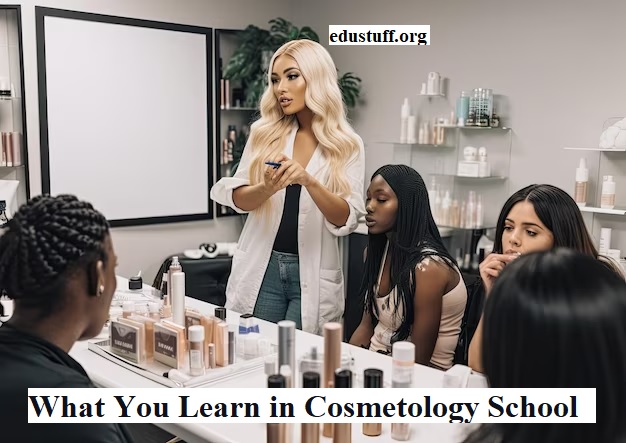
What You Learn in Cosmetology School (A Comprehensive Guide)
A Comprehensive Guide to What You Learn in Cosmetology School
What You Learn in Cosmetology School (A Comprehensive Guide)
Cosmetology is the study and application of beauty treatments involving the care of hair, skin, and nails. It encompasses a wide range of practices, from hair styling, cutting, and coloring to skincare, makeup application, and nail care. Cosmetologists are trained professionals who provide services to enhance the appearance and well-being of their clients.
In the beauty industry, cosmetology plays a crucial role as it helps individuals achieve their desired looks and boosts their self-confidence.
Cosmetologists not only provide aesthetic treatments but also offer advice on skincare routines, recommend products, and educate clients on maintaining healthy hair, skin, and nails. Their expertise and skills contribute significantly to the overall beauty and grooming of individuals, making cosmetology an integral part of the industry.
The key skills and knowledge gained through cosmetology education
Cosmetology education equips individuals with a diverse set of skills and knowledge essential for success in the beauty industry:
- Technical Skills:
- Hair care: Cosmetology programs cover cutting, styling, and coloring techniques for different hair types. This includes understanding textures, using various tools (scissors, razors, etc.), and applying color theory.
- Skincare: Learning about facial treatments, analyzing skin types, performing facials, and recommending skincare routines and products tailored to individual needs.
- Makeup Application: Understanding facial features, color theory, and various makeup styles for different occasions, as well as mastering techniques like contouring, highlighting, and blending.
- Nail Care: Techniques for manicures, pedicures, nail art, and applying extensions or enhancements.
- Product Knowledge:
- Understanding ingredients, formulations, and their effects on different skin and hair types.
- Recognizing reputable brands and product lines and knowing their specific uses and benefits.
- Client Communication:
- Develop active listening skills to understand client preferences and concerns.
- Effective communication to translate client desires into achievable beauty goals.
- Providing consultations and explaining procedures clearly.
- Sanitation and Safety:
- Adhering to strict hygiene standards, including proper sterilization of tools and equipment.
- Understanding and following safety protocols to prevent accidents or reactions.
- Anatomy and Physiology:
- Studying the structure and functions of skin, hair, and nails to provide informed services.
- Knowing how different treatments or products interact with the body.
- Business and Marketing Skills:
- Learning salon management, including inventory control, scheduling, and staff management.
- Marketing strategies to attract and retain clients, understanding client retention techniques, and fostering a loyal customer base.
- Basics of financial management and bookkeeping for running a successful salon or freelance business.
- Trends and Innovation:
- Staying updated on emerging trends, new technologies, and innovative techniques through continued education, workshops, and industry events.
- Incorporating new trends into services to provide clients with modern, sought-after treatments.
This comprehensive education empowers cosmetologists not just with technical expertise but also with the skills needed to communicate effectively, ensure safety and hygiene, run a successful business, and stay at the forefront of a constantly evolving industry.
The Four Pillars of Cosmetology Education
- Hair Care and Styling:
Anatomy and Physiology of Hair:
- Understanding the structure of hair, including the hair follicle, shaft, and root.
- Knowledge of the hair growth cycle, hair loss, and common scalp conditions.
Hair Types and Textures:
- Identifying different hair types (straight, wavy, curly, coily) and textures (fine, medium, coarse).
- Recognizing variations in density, porosity, and elasticity of hair.
Shampooing, Conditioning, and Styling Techniques:
- Proper techniques for washing and conditioning hair based on its type and condition.
- Learning various styling methods using tools like blow dryers, flat irons, curling irons, and hot rollers.
Haircutting and Coloring:
- Mastering cutting techniques for different hair lengths and styles.
- Understanding the principles of color theory, application, and correction.
- Knowledge of various coloring methods such as highlights, balayage, and ombre.
Hair Extensions and Chemical Treatments:
- Learning about different types of hair extensions, including weaves, clip-ins, and tape-ins.
- Understanding chemical treatments like perms, relaxers, and keratin treatments.
- Ensuring safety protocols and understanding the effects of these treatments on hair health.
2. Skin Care and Makeup Artistry:
Anatomy and Physiology of Skin:
- Understanding the layers of the skin, its functions, and the factors affecting skin health.
- Identifying different skin types (normal, oily, dry, combination, sensitive) and skin conditions (acne, rosacea, aging signs).
Skincare Routines and Product Knowledge:
- Develop personalized skincare routines based on individual skin types and concerns.
- Recommending appropriate skincare products (cleansers, toners, moisturizers, serums, sunscreens) considering ingredients and their effects.
Facial Treatments:
- Learning facial massage techniques, exfoliation methods, and applying masks or peels for skin rejuvenation and cleansing.
- Understanding how to perform extractions and address specific skin issues.
Makeup Application Techniques:
- Mastering application techniques for different types of makeup (day, evening, bridal, editorial, special events).
- Understanding proper foundation matching, contouring, highlighting, and blending techniques.
Color Theory and Application:
- Understanding color principles, undertones, and how they apply to makeup selection.
- Learning eye shadow blending, lipstick application, and color correction techniques.
Special Effects Makeup:
- Creating theatrical or special effects makeup for film, television, theater, or creative events.
- Using prosthetics, latex, special makeup tools, and materials for creating various effects (aging, wounds, and fantasy characters).
Client Consultation and Communication:
- Conducting thorough consultations to understand client preferences, skin concerns, and desired makeup looks.
- Recommending makeup styles or products tailored to specific occasions, skin tones, and preferences.
3. Nail Care:
Anatomy and Physiology of Nails:
- Understanding the structure of nails, including the nail plate, nail bed, cuticles, and nail matrix.
- Learning about nail growth, common nail disorders, and conditions affecting nail health.
Manicures and Pedicures:
- Manicures: Techniques for cleaning, shaping, and polishing fingernails, including cuticle care, nail filing, and hand massage.
- Pedicures: Similar techniques applied to toenails, along with exfoliation, callus removal, and foot massage.
Acrylic and Gel Nails:
- Learning the application and removal of artificial nail enhancements like acrylics and gels.
- Understanding proper techniques for shaping, sculpting, and maintaining artificial nails.
Nail Art and Design:
- Mastering various nail art techniques such as hand painting, stamping, embellishments, and use of nail decals or gems.
- Creatively designing and executing intricate nail designs for different occasions or client preferences.
Nail Repair and Maintenance:
- Identifying and addressing nail damage or issues, including techniques for repairing cracked or broken nails.
- Educating clients on proper nail care, maintenance between salon visits, and methods to promote nail health.
Hygiene and Sanitation:
- Emphasizing hygiene practices, sterilization of tools, and maintaining a clean and sanitized workstation to prevent infections or contamination.
Client Consultation and Communication:
- Conducting consultations to understand clients’ preferences for nail shapes, lengths, colors, and designs.
- Communicating options for nail care, enhancements, or designs tailored to client’s needs and style preferences.
Cosmetology education in nail care not only focuses on aesthetics but also prioritizes nail health, sanitation, and client satisfaction. Professionals are trained not only in the artistic aspect of nail beautification but also in maintaining and promoting the overall health of nails.
4. Business and Professionalism:
Salon Management and Operations:
- Workflow and Organization: Understanding the flow of a salon, managing appointments, and optimizing time to serve clients efficiently.
- Inventory Management: Handling stock, ordering supplies, and maintaining inventory levels for products and tools.
- Staffing and Team Management: Hiring, training, scheduling, and supervising salon staff to ensure a cohesive and productive team.
Customer Service and Communication Skills:
- Client Interaction: Developing strong interpersonal skills to build rapport, listen actively, and understand client needs and preferences.
- Problem Resolution: Handling client complaints or issues with professionalism and finding satisfactory solutions.
Retail Sales and Product Knowledge:
- Product Recommendations: Educating clients about various beauty products their benefits, and recommending suitable products for their specific needs.
- Up selling and Cross-Selling: Enhancing sales by recommending complementary products or services to clients based on their preferences.
Marketing and Branding for Cosmetology Professionals:
- Branding Yourself: Creating a personal brand, defining your unique style or specialty, and establishing a professional image.
- Marketing Strategies: Utilizing social media, websites, and other marketing tools to promote services, showcase work, and attract new clients.
- Client Retention Strategies: Implementing loyalty programs, referral incentives, or special promotions to retain and attract clients.
Business Ethics and Legal Considerations:
- Ethical Practices: Understanding and upholding ethical standards in client interactions, product recommendations, and services offered.
- Legal Knowledge: Understanding licensing requirements, health and safety regulations, and adhering to local or state cosmetology laws.
Read Also:
Careers in Educational Psychology: Building Brighter Futures
what is a career support programme?
Career Objectives on a Resume: Path to Success
Additional Aspects of Cosmetology Education
- Safety and Sanitation:
Safety and sanitation are paramount in cosmetology education to ensure the well-being of both clients and professionals. Here’s a deeper dive into these crucial aspects:
Proper Disinfection and Sterilization Procedures:
- Tools and Equipment Sanitization: Understanding and implementing proper sterilization techniques for tools like scissors, combs, razors, and other reusable equipment.
- Surface Sanitization: Cleaning and sanitizing workstations, treatment areas, and common surfaces to prevent the spread of germs and infections.
- Product Handling: Using hygienic practices when handling and dispensing products to prevent cross-contamination.
- Blood borne Pathogen Prevention:
- Knowledge and Training: Educating professionals about blood borne pathogens, such as hepatitis or HIV, and the necessary precautions to prevent their spread.
- Handling Accidents or Injuries: Knowing proper procedures in case of accidental exposure to blood or bodily fluids and following protocols for first aid and reporting.
- Salon Safety Regulations and Compliance:
- Understanding Regulations: Being familiar with local, state, and federal regulations regarding sanitation, hygiene, and safety in cosmetology practices.
- Compliance with Standards: Adhering to guidelines set by regulatory bodies, including maintaining clean and sanitized facilities and following safety protocols.
- Personal Protective Equipment (PPE):
- Utilization of PPE: Using protective gear such as gloves, masks, and aprons to prevent direct contact with chemicals or bodily fluids.
- Safety Measures during Services: Ensuring proper ventilation in the salon and using protective barriers where necessary to minimize exposure.
Career Advancement:
Career advancement in cosmetology involves several key elements that empower professionals to grow and excel in the industry:
- Licensing Requirements and Continuing Education:
- Understanding and fulfilling licensing requirements specific to the region or state.
- Commitment to ongoing learning through continuing education courses, workshops, or advanced certifications to stay updated with industry trends and techniques.
- Networking and Professional Development Opportunities:
- Engaging in industry events, seminars, and trade shows to network with peers, mentors, and industry leaders.
- Joining professional associations or groups that offer resources, support, and opportunities for skill enhancement and career growth.
- Specializing in Specific Areas of Cosmetology:
- Identifying and honing expertise in a particular niche, such as hair color specialist, skincare expert, makeup artist for special effects, or nail art professional.
- Continuous practice and education in the chosen specialization to become a go-to expert in that field.
- Entrepreneurship and Salon Ownership:
- Gaining business acumen and management skills to venture into salon ownership or freelance entrepreneurship.
- Understanding the nuances of salon operations, including staffing, marketing, financial management, and customer service.
Conclusion
Cosmetology education is a rich and multifaceted journey that encompasses a wide spectrum of skills, knowledge, and artistry. It’s more than just learning the techniques of hair, skin, and nail care; it’s about mastering the art and science behind beauty.
From understanding the intricate anatomy of hair, skin, and nails to mastering the application of makeup, learning salon management, and embracing safety and sanitation practices, cosmetology education, is comprehensive. It’s a holistic approach that blends creativity, technical expertise, and business acumen, ensuring that professionals are not only skilled in their craft but also equipped with the tools to thrive in a dynamic industry.
For those aspiring to venture into the world of cosmetology, I encourage you to pursue your dreams with confidence. Embrace the learning journey, immerse yourself in the diverse aspects of beauty, and seize every opportunity to expand your skills and knowledge.
Cosmetology offers a canvas for your creativity, a platform to make others feel confident and beautiful, and a pathway to a fulfilling and rewarding career.
Believe in your passion, commit to continuous learning, and embark on this exciting journey with the confidence that comes from knowing you’re entering a field that celebrates individuality, creativity, and the transformative power of beauty. Your dreams in cosmetology await—embrace them boldly!
Call to Action
If you’re eager to kick start your journey in cosmetology, now’s the perfect time to explore the array of opportunities available in your area. Whether you dream of becoming a skilled hairstylist, a makeup artist extraordinaire, a nail care specialist, or even owning your salon, there’s a cosmetology school ready to help you turn those dreams into reality.
Here are some resources and websites to get you started:
- Beauty Schools Directory: A comprehensive directory offering information on cosmetology schools, programs, and resources across the United States.
- American Association of Cosmetology Schools (AACS): AACS provides information about accredited cosmetology programs, scholarships, and industry updates.
- Cosmetology Edu Classes: Offers a range of online courses, resources, and information on cosmetology education and licensing requirements.
- State Licensing Boards: Check with your state’s licensing board for specific requirements and approved cosmetology programs in your area.






